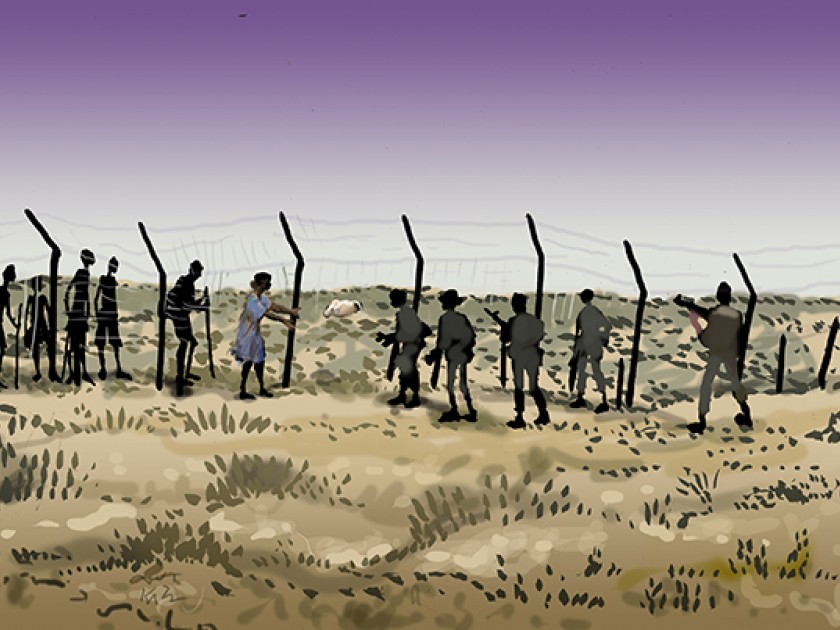
Earlier this week, Haim Watzman wrote about producing new stories on a monthly deadline for The Jerusalem Report. With the release of his new book, Necessary Stories, Haim is guest blogging for the Jewish Book Council all week as part of the Visiting Scribe series here on The ProsenPeople.
Two of the tales that appear in Necessary Stories, my new collection, closely follow passages in the Babylonian Talmud. If you’ve ever studied or tried to read this central Jewish text, you might find that puzzling. The Gemara, the largest part of the Babylonian Talmud, records the discussions and arguments that several generations of rabbis living in what is now Iraq engaged in between the third and fifth centuries of the Common Era.
To the untrained eye — indeed, even to the well-versed one — the discussions can be vexingly cryptic, arcane, and difficult to understand. In fact, it is that difficulty that has made mining its wisdom and interpreting its disputations the central occupation of traditional Jewish scholarship ever since.
“In Exile, at Home” recasts a debate that appears on page 25b of the tractate Sukkah. The tractate focuses, as one might expect, on the laws and observances incumbent on Jews during the week-long holiday of Sukkot, the Festival of Booths, which occurs in the early fall, just after Yom Kippur. One of those laws is the requirement during that week to live — in particular, to have one’s meals and to sleep — in a sukkah,a ramshackle temporary home rather than in one’s apartment or house. This commandment is accompanied by another — a commandment to be joyous during the holiday.
The sugiya (a passage of Talmud devoted to discussing a specific issue) brings up a problem presented by some classes of people who might have trouble being joyous in a sukkah. Specifically, it asks about people who are mourning for a loved one and a bride and groom just after their wedding. Instead of a dialogue between rabbis, “In Exile, at Home” presents a dialogue between me and one of the participants in the Talmudic discussion, Abba Bar Zabda. Bar Zabda encounters me sitting beside the grave of my younger son in the Mt. Herzl Military Cemetery in Jerusalem. Our discussion reproduces the Talmudic dialectic and Bar Zabda leads me to an insight: “A bride and groom do not need to be commanded to rejoice … A mourner needs the commandment. Otherwise he will stay forever in exile and never be open to redemption.”
“Sin Offering” (the illustration for which, by Avi Katz, accompanies this post) combines another sugiya, from tractate Baba Batra, page 10b, with a harrowing story about African refugees trying to cross the border from Egypt into Israel. The latter story was told to me by my youngest daughter, Misgav, when she was a soldier in the Caracal Brigade, a mixed-sex infantry unit that patrols the Egyptian-Israeli border. In “Sin Offering,” a squad of soldiers reports to their commanding officer at dawn about a border incident that took place an hour or so earlier. The incident ended with one man wounded and the refugees sent back into the Sinai Desert to almost certain death. The soldiers have followed their orders, but some of them are uneasy. Each soldier presents his own perspective, but most of them are eager to justify what they have done.
Their report to their officer is interwoven with a debate over the meaning of a verse from the Bible’s Book of Proverbs (14:34). It is this debate over the verse that is the subject of the sugiya. It is led by Rabban Yohanan Ben Zakkai, who led the remnant of the Jewish community in Israel after the Roman destruction of Jerusalem in 70 CE and remolded the Jewish faith so that it was centered on study and charity instead of on the Temple’s sacrificial service. Ben Zakkai asks his students the meaning of the verse in Proverbs and they all try to interpret it in a way that reflects well on the charitable actions of Jews and badly on those of non-Jews. At the end, Ben Zakkai cleverly recasts the interpretation of the last of them to say exactly the opposite — that non-Jews and Jews have equal access to God’s mercy when they give charity.
Perhaps, then, it should not be surprising that Talmudic disputations can be the basis of good fiction. They have sharply drawn characters, suspense, and even that final twist that so many good stories have. You just know have to read them properly, and imagine them in a modern context.
Haim Watzman lives in Jerusalem and is the author of three books: Company C: An American’s Life as a Citizen-Soldier in Israel; A Crack in the Earth: A Journey Up Israel’s Rift Valley; and a story collection, Necessary Stories, a selection of the more than 150 he has written. His play The Chair won the 2021 Theater Institute Award of the Contemporary Jewish Drama International Competition sponsored by the Estera Rachel and Ida Makinskie Jewish Theater in Warsaw. He has translated more than 50 books from Hebrew into English, among them works by Shlomo Avineri, David Grossman, Hillel Cohen, Amos Oz, and Tom Segev. He edited the English-language version of Yuval Noah Harari’s worldwide bestseller, Sapiens. Subscribe to his Substack newsletter here.